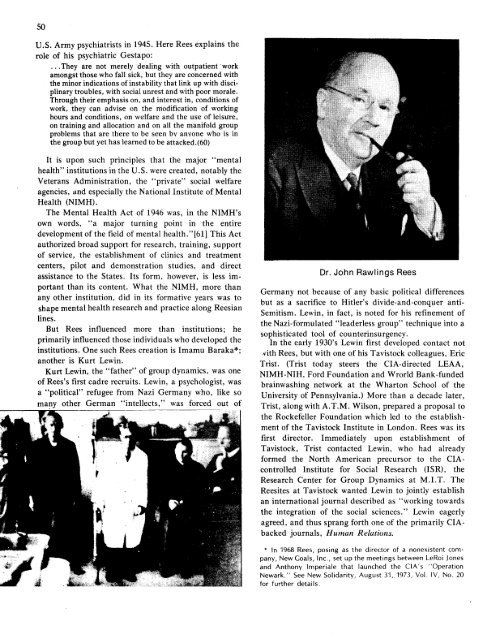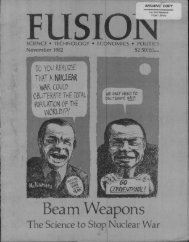The Campaigner
The Campaigner
The Campaigner
You also want an ePaper? Increase the reach of your titles
YUMPU automatically turns print PDFs into web optimized ePapers that Google loves.
50<br />
U.S. Army psychiatrists in 1945. Here Rees explains the<br />
role of his psychiatric Gestapo:<br />
...<strong>The</strong>y are not merely dealing with outpatient work<br />
amongst those who fall sick, but they are concerned with<br />
the minor indications of instability that link up with disciplinary<br />
troubles, with social unrest and with poor morale.<br />
Through their emphasis on, and interest in, conditions of<br />
work, they can advise on the modification of working<br />
hours and conditions, on welfare and the use of leisure,<br />
on training and allocation and on all the manifold group<br />
problems that are there to be seen by anyone who is in<br />
the group but yet has learned to be attacked.(60)<br />
It is upon such principles that the major "mental<br />
health" institutions in the U.S. were created, notably the<br />
Veterans Administration, the "private" social welfare<br />
agencies, and especially the National Institute of Mental<br />
Health (NIMH).<br />
<strong>The</strong> Mental Health Act of 1946 was, in the NIMH's<br />
own words, "a major turning point in the entire<br />
development of the field of mental health." [61] This Act<br />
authorized broad support for research, training, support<br />
of service, the establishment of clinics and treatment<br />
centers, pilot and demonstration studies, and direct<br />
assistance to the States. Its form, however, is less im- Dr. John Rawlings Rees<br />
portant than its content. What the NIMH, more than<br />
any other institution, did in its formative years was to<br />
but as a sacrifice to Hitler's divide-and-conquer anti-<br />
Semitism. Lewin, in fact, is noted for his refinement of<br />
shape mental health research and practice along Reesian<br />
Germany not because of any basic political differences<br />
lines, the Nazi-formulated "leaderless group" technique into a<br />
But Rees influenced more than institutions; he<br />
sophisticated tool of counterinsurgency.<br />
primarily influenced those individuals who developed the In the early 1930's Lewin first developed contact not<br />
institutions. One such Rees creation is Imamu Baraka*; _¢ith Rees, but with one of his Tavistock colleagues, Eric<br />
another is Kurt Lewin. Trist. (Trist today steers the CIA-directed LEAA,<br />
Kurt Lewin, the "father" of group dynamics, was one NIMH-NIH, Ford Foundation and Wrorld Bank-funded<br />
of Rees's first cadre recruits. Lewin, a psychologist, was brainwashing network at the Wharton School of the<br />
a "political" refugee from Nazi Germany who, like so University of Pennsylvania.) More than a decade later,<br />
many other German "intellects," was forced out of Trist, alongwith A.T.M. Wilson, prepared a proposal to<br />
the Rockefeller Foundation which led to the establishment<br />
of the Tavistock Institute in London. Rees was its<br />
first director. Immediately upon establishment of<br />
Tavistock, Trist contacted Lewin, who had already<br />
formed the North American precursor to the CIAcontrolled<br />
Institute for Social Research (ISR), the<br />
Research Center for Group Dynamics at M.I.T. <strong>The</strong><br />
Reesites at Tavistock wanted Lewin to jointly establish<br />
an international journal described as "working towards<br />
the integration of the social sciences." Lewin eagerly<br />
agreed, and thus sprang forth one of the primarily CIAbacked<br />
journals, Human Relations.<br />
_:'<br />
* In 1968 Rees, posing as the director of a nonexistent company,<br />
New Coals, Inc., set up the meetings between LeRoi Jones<br />
and Anthony Imperiale that launched the CIA's "Operation<br />
Newark." See New Solidarity, August 31,.1973, Vol. IV, No. 20<br />
for further details.

















